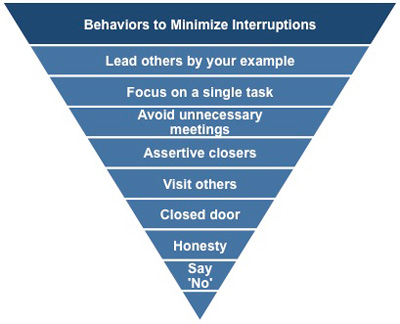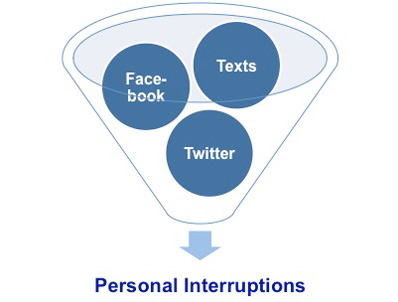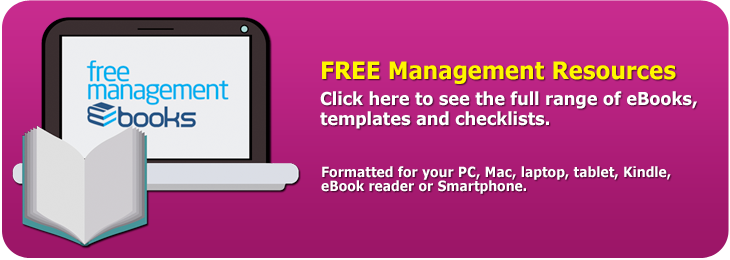Techniques to Minimize Interruptions at Work
There are some well-known techniques that will help divert interruptions from interfering with your protected periods of time. Many of these are simple to introduce and use in your working practices. You will have to select those most suited to your role and workplace.
 |
As with many management techniques the most important factor to ensure your interruptions are managed and minimized is to be consistent in your approach. You must avoid being pressured or persuaded to relax your chosen barriers, because once you do so, your ability to control your interruptions will be undermined.
Closed Door - if you have your own office you can easily create your own protected time by simply closing your door at such times. This erects an extremely effective barrier to social interruptions.
This strategy must be used sparingly so that your colleagues know that if they need to speak to you urgently on an important matter, this barrier is surmountable. If used to excess you will create your own 'Ivory Tower' that others will feel unable to penetrate and you will become less effective as a manager.
Signs - Many workplaces have nameplates on each desk for easy identification. If this is true for you then you can use your nameplate to create a barrier to interruptions. If your name is showing you are available, if the back is showing you are unavailable. You could make this clear by putting a sign on the back saying 'please do not disturb.'
By placing this clearly on your desk anyone approaching can easily see whether or not you can be disturbed. The downside of this is that it is easy for others to ignore and you will have to be assertive, yet diplomatic, in how you prevent such interruptions.
Visit Others - By visiting your most talkative interrupters, you have more control over the length of your stay. It is important that you have a purpose to your visit and set yourself a time limit. These will keep you focused on your objective for the visit and you will retain control of the conversation.
You can also time this to coincide with small breaks such as going to get a drink or something similar, ensuring your productivity is not compromised. Be mindful you don't turn into the interrupter!
Meetings - If you know talkative colleagues are part of a meeting, in order to ensure that they don't prolong its length, make sure you have a timed agenda that you adhere to. You must ensure that every meeting you set up or attend has an objective and a desired outcome that you wish to achieve by the end of the meeting. By communicating the latter to all attendees prior to the meeting, you will have set a focused atmosphere.
You can also schedule the meeting so that it precedes another of their commitments or a break period. In this way there is a very compelling reason for all participants to adhere to your timings.
Assertive Closers - in an assertive but polite manner inform the person disturbing you that you have a commitment - for example, a report or presentation that you have to finish 'by lunch time' or a specific point in time. In this way you acknowledge them whilst preventing the interruption.
If appropriate, you can also let them know of a time that you are able to discuss their concern. This shows the person that you acknowledge their concern and will deal with it when you are able to focus on it completely.
 |
Personal Calls and Texts - modern communications make it appear easy to be available 24/7. But this illusion can be very disruptive, as all our contacts, both friends and colleagues, know they can speak to or contact us at any time. Contact can be in the form of a text, FaceBook posting, Twitter message, and many other forms of cyber communication; the list just goes on and on.
There is a simple way to control this type of interruption and that is by ensuring you communicate to all your friends that any personal calls are conducted outside working hours, unless it is an emergency. You need to then act on this principle and not fall into the trap of responding until a non-working break or at the end of the day. In this way we remain focused and efficient in our work.
Honesty - Explain to your team or colleagues that you have a heavy schedule and that to complete it all, you must work more effectively and that you will be using these methods in order to give you protected time to work efficiently. Make sure they are aware of when you are available to them to ensure good communications are maintained.
Single Task Focus - whilst we all exist in a 'multi-tasking' environment and are continually expected to switch back and forth between projects, this is not an effective way to work, as it is too distracting. A more efficient method of working is to complete specific tasks within a project before being diverted to another.
Avoid Unnecessary Meetings - meetings for the sake of meetings can be a major interruption to our productivity. To ensure that we only attend those that are necessary, we must first ensure that a meeting is the best way to handle the issue. Could a simple email or call achieve the same objective? If the meeting is necessary does it have a clear objective and are only the essential individuals involved?
Just say 'No'! - learning how to say 'No' gracefully is essential for our productivity. Wanting to be a team player is natural for most people so accepting invitations to lunch or casual updates is an easy distraction to succumb to.
The best way to say 'No' is to do so by offering an alternative to the person's request. For example:
'Can we have lunch on Friday rather than today?'
'The project's going well but to keep on track I must finish this; I'll happily update you tomorrow afternoon.'
'Practice what you Preach' - this is one of the most important ways that you can improve productivity within an organization. By not interrupting others without a good reason or as a planned event, you won't be contributing to the overall problem of 'interruptions.'
As a manager you can lead by the example you set to your team and other colleagues. If they see these types of working practices being adopted by you, they will emulate them as we all want to feel part of a team. The ethos of your organization will contribute to differing degrees of your success in this area.
If the nature of your work means that you suffer from many unavoidable interruptions, you will have to be assertive when defending your protected periods of work. Each time you are interrupted you will have to assess whether the nature of the interruption is more important than your current task. It is also important to be conscious of interruptions that you cause to yourself and take steps to eliminate as many of these as possible.
You may also be interested in:
Handling Interruptions | Controlling Interruptions | Identifying Interruptions | Limiting Inappropriate Socializing | Managing Phone Interruptions | Cold Call Elimination | Managing Your Outbound Calls | How to Stop Constantly Checking Emails.



